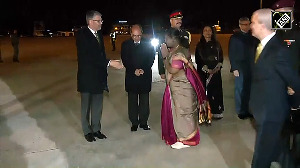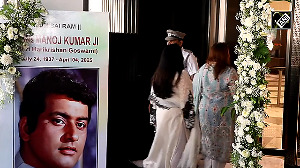Leading South Asia experts have assured the United States Congress that the prospect of Pakistan's nuclear arsenal falling into fundamentalist hands is, at least in the short term, unlikely.
They have said, too, that the long range security of these weapons depends on the stability and professionalism of the Pakistani army.
Ashley Tellis, senior associate with the Carnegie Endowment for International Peace, told the House Subcommittee on Foreign Affairs dealing with South Asia: 'It is my judgment that Pakistan's strategic assets -- to include its nuclear devices, its delivery systems, and its stockpile of fissile materials -- are fundamentally safe today.
'Compared to the situation in the late 1980s and early 1990s,' he continued, 'when Pakistan's nuclear arsenal was still relatively vulnerable to a variety of external and internal threats, the security of these assets has improved dramatically as a result of the protective measures put in place since the late 1990s.' Tellis gave 'singular credit' for this to Director General of Pakistan's Strategic Plans Division, retired Lieutenant General Khalid Kidwai.
Tellis gave 'singular credit' for this to Director General of Pakistan's Strategic Plans Division, retired Lieutenant General Khalid Kidwai.
Tellis said that the safeguards Pakistan, led by Kidwai, had put into place 'focused on insulating the strategic reserves against both external and international dangers, involve a combination of solutions ranging from tightened physical security at strategic installations, to large investments in opacity and deception and denial, to incorporation of technical controls on the nuclear weapons themselves, to the institutionalization of organizational solutions aimed at preventing insider threats.'
Issuing a caveat, Tellis said, 'The most potent threat to the security of Pakistan's nuclear estate currently arises primarily from contingencies involving a fissure in the Pakistani military and a breakdown in the system of authority and command.'
He did not think such a scenario was realistic, Tellis however said. 'Even if relations between (Pakistan) President Pervez Musharraf and the Chief of Army Staff General Kiyani, were to become estranged to the point of rupture, the threat of a breakdown in the command system of the Pakistani military would be minimal, given that Musharraf no longer enjoys any line-level control over his nation's armed forces.'
He said that even if some Islamist parties 'were to come to power through the ballot in Pakistan, they would enjoy no operational control over Pakistan's nuclear assets.'
Tellis said the only 'truly extreme scenario' could be if the 'chief of army staff himself turns out to be secretly a political extremist.'
Discussing the long term threats, Tellis said, 'If the rising tide of Islamization in Pakistani society seeps into its armed forces or into its scientific establishments -- as many fear it already has, especially in the lower ranks -- and the SPD's internal security mechanisms fail to detect the threat either because they are themselves compromised or because of oversight errors and deficiencies, the security of Pakistan's nuclear weapons and materials may once again be at risk.'
This, he said, was a good reason for the United States to remain engaged with the Pakistan military, in order to mitigate such a threat if and when it arose.
Lisa Curtis, research fellow at the Heritage Foundation and an erstwhile analyst with the Central Intelligence Agency, agreed with Tellis that there was no immediate threat to Pakistan's nuclear assets, but added: "During the current political transition, Washington will need to be diligent in pursuing policies that promote the safety and security of Islamabad's nuclear assets."
Curtis pointed at the results of investigations into the nuclear black market run by Abdul Qadeer Khan, and pointed out that it demonstrated "the devastating consequences of nuclear proliferation by individuals with access to state-controlled nuclear programs."
She said that although Khan "avoided engaging Al Qaeda on nuclear issues, earlier revelations about a group of former Pakistani military officials and nuclear scientists who met with Osama bin Laden around the time of 9/11, remind us of the continuing threat of the intersection of terrorism and nuclear weapons in Pakistan."
She was categorical that the current civil unrest in Pakistan does not endanger the safety of Pakistan's nuclear arsenal, but added that the main threat in the foreseeable future "stems from the potentiality of Al Qaeda penetrating the system clandestinely through retired officials with extremist sympathies."
This, Curtis argued, is why "it is more important to focus on helping Pakistan institute procedures like improving its personnel reliability programs than to discuss openly plans for emasculating its nuclear capabilities."
Christine Fair of the Rand Corporation, which is sometimes considered the Pentagon's think tank, agreed with Tellis and Curtis, and said there was no reason to think existing policies and procedures (for safeguarding the nuclear arsenal) are inadequate."
Fair, a South Asia specialist who has done much field research in Pakistan where she studied militancy especially in the Jammu and Kashmir region, said in view of consistent fear of an inner cabal of Islamist officers who can split away from the rest of the army and compromise this arsenal, it is understandable the concerns about nuclear safety in Pakistan will persist.
"Nuclear safety should remain a focus of US-Pakistan military-to-military engagement to the greatest extent possible," Fair said.
She pointed out that though recent attacks on Pakistan military and leadership targets have involved penetration of the armed forces, "these remain the exception, not the rule."
"There are numerous reasons to believe that the Pakistani army may be more anti-American and more conservative than one would like to countenance," Fair said.
"Unfortunately, recruitment data on the military is virtually non-existent and thus it is difficult to say with any confidence whether and how this institution is change."
However, Fair advised that "these historical trends should caution US policy against tightly aligning itself with an institution it does not and indeed cannot understand."





 © 2025
© 2025